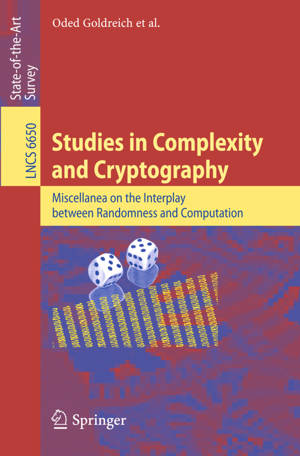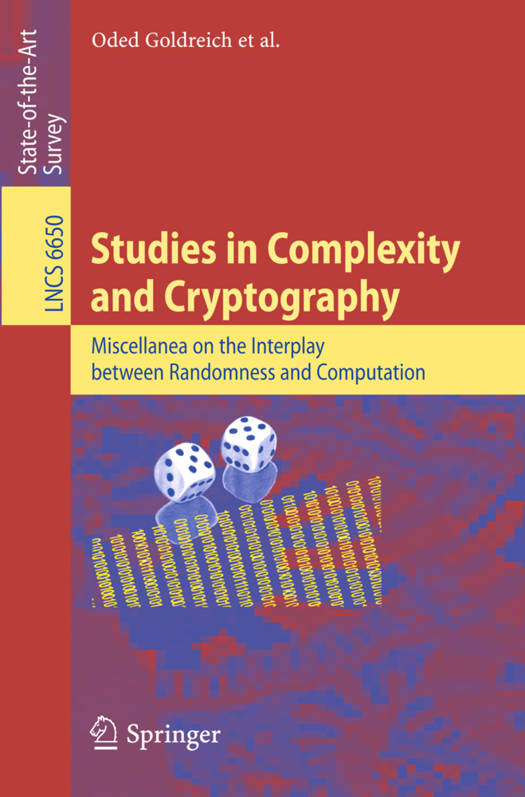
- Afhalen na 1 uur in een winkel met voorraad
- Gratis thuislevering in België vanaf € 30
- Ruim aanbod met 7 miljoen producten
- Afhalen na 1 uur in een winkel met voorraad
- Gratis thuislevering in België vanaf € 30
- Ruim aanbod met 7 miljoen producten
Zoeken
Studies in Complexity and Cryptography
Miscellanea on the Interplay Between Randomness and Computation
Oded Goldreich
€ 94,95
+ 189 punten
Omschrijving
This book presents a collection of 36 pieces of scientific work in the areas of complexity theory and foundations of cryptography: 20 research contributions, 13 survey articles, and 3 programmatic and reflective viewpoint statements. These so far formally unpublished pieces were written by Oded Goldreich, some in collaboration with other scientists.
The articles included in this book essentially reflect the topical scope of the scientific career of Oded Goldreich now spanning three decades. In particular the topics dealt with include average-case complexity, complexity of approximation, derandomization, expander graphs, hashing functions, locally testable codes, machines that take advice, NP-completeness, one-way functions, probabilistically checkable proofs, proofs of knowledge, property testing, pseudorandomness, randomness extractors, sampling, trapdoor permutations, zero-knowledge, and non-iterative zero-knowledge.
All in all, this potpourri of studies in complexity and cryptography constitutes a most valuable contribution to the field of theoretical computer science centered around the personal achievements and views of one of its outstanding representatives.
The articles included in this book essentially reflect the topical scope of the scientific career of Oded Goldreich now spanning three decades. In particular the topics dealt with include average-case complexity, complexity of approximation, derandomization, expander graphs, hashing functions, locally testable codes, machines that take advice, NP-completeness, one-way functions, probabilistically checkable proofs, proofs of knowledge, property testing, pseudorandomness, randomness extractors, sampling, trapdoor permutations, zero-knowledge, and non-iterative zero-knowledge.
All in all, this potpourri of studies in complexity and cryptography constitutes a most valuable contribution to the field of theoretical computer science centered around the personal achievements and views of one of its outstanding representatives.
Specificaties
Betrokkenen
- Auteur(s):
- Uitgeverij:
Inhoud
- Aantal bladzijden:
- 564
- Taal:
- Engels
- Reeks:
- Reeksnummer:
- nr. 6650
Eigenschappen
- Productcode (EAN):
- 9783642226694
- Verschijningsdatum:
- 3/08/2011
- Uitvoering:
- Paperback
- Formaat:
- Trade paperback (VS)
- Afmetingen:
- 155 mm x 234 mm
- Gewicht:
- 861 g

Alleen bij Standaard Boekhandel
+ 189 punten op je klantenkaart van Standaard Boekhandel
Beoordelingen
We publiceren alleen reviews die voldoen aan de voorwaarden voor reviews. Bekijk onze voorwaarden voor reviews.











